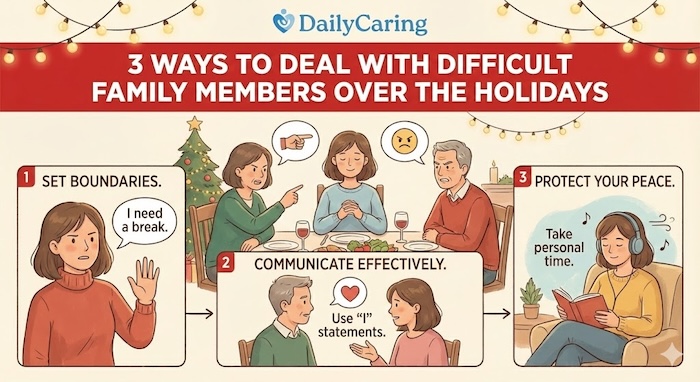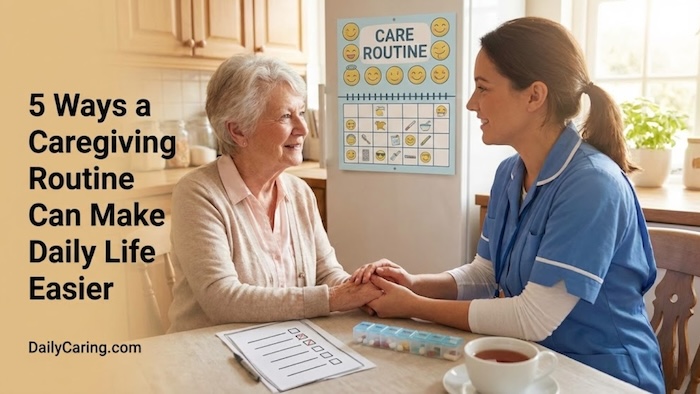The holiday season is meant to be a time of joy and connection, but for caregivers, family gatherings can often amplify stress rather than relieve it. Critical comments from relatives, unsolicited advice about your caregiving approach, or the silent burden of unequal responsibilities can quickly drain the joy from your celebrations.
If you're already bracing for complicated family dynamics, know that you have the power to shift these interactions. These three practical strategies will help you set boundaries, communicate effectively, and protect your peace, ensuring you can navigate family events with greater confidence and less conflict.

Holiday Celebrations Can Be Stressful
The stress of the holidays can bring out the worst in people. It’s a hectic time that’s full of unreasonable expectations.
That can make brutal or insensitive family members especially hard to deal with when you’re caring for an older adult and hoping for extra support.
We’ve all struggled with family members who:
- Don’t invite you or your older adult to their holiday gatherings
- Extend an invitation, but don’t consider your older adult’s needs and realistic capabilities
- Are offended when you explain that your older adult can no longer participate in particular family traditions
- Blame YOU for being difficult or overprotective of your older adult
To make your holiday season more pleasant, we share three ways to deal with difficult individuals.
3 Tips on Dealing with Family During the Holidays
1. Reset Your Own Expectations
Consistently thoughtless people are unlikely to change their behavior, so your best option is to adjust your expectations.
Don’t expect your brother, who hasn’t called all year, to visit Mom for the holidays.
Stop hoping that your sister, who’s always full of excuses why she can’t help care for dad, will come through in the end and help you prepare Thanksgiving dinner.
Once you accept the fact that they’re not going to change, you can make your own plans without anxiously wondering if a holiday miracle will happen.
While it's certainly not ideal or fair, removing the uncertainty reduces stress and helps you get on with your holiday season and enjoy it as much as possible.
2. Reset Your Loved One's Expectations
Despite these uncooperative family members, you still want an older adult to feel the holiday love and togetherness.
So if holiday plans don’t turn out as expected, let them know about significant changes in advance so they won’t feel blindsided.
But in some cases, you may want to protect them from getting hurt by fibbing about the reason why things will be different.
This may be needed if your older adult has dementia and won’t be able to process hurt feelings fully, or if they will repeatedly ask about holiday plans.
For example, your sister hosts Thanksgiving dinner, but doesn’t want you to bring Dad because she can’t handle seeing him now that his Alzheimer’s disease has progressed.
A few days before the dinner, tell your dad that your sister and family just got a terrible case of the flu. The doctor says they’re highly contagious and have to stay in bed and away from others. Instead, you’ll be hosting the lovely Thanksgiving dinner.
Your dad will be disappointed, but not as upset as he would be if he knew he wasn’t welcome at your sister’s table.
3. Exclude Toxic Family Members
Certain family members are mean and nasty, looking for financial handouts, or bring up unpleasant memories for your older adult.
The holidays may be a time for togetherness, but these toxic individuals take the joy out of the season.
To protect your older adult and yourself, don’t feel guilty about excluding those people from your holiday gathering.
To reduce possible confrontation, you might use health concerns as an excuse.
If they do confront you about being left out, you could say something like “I’m sorry, but Mom isn’t well enough this year for a large group. Maybe we can arrange a visit after the holidays.”
Final Thoughts on Dealing with Difficult Family Members During the Holidays
Remember, you cannot control your relatives' behavior, but you can control how you respond to it. By implementing these approaches, you're not just surviving the holidays; you're actively protecting your emotional well-being and the quality of care you provide.
Permit yourself to prioritize what truly matters: your connection with your loved one and your own mental health. This holiday season, may you find strength in your boundaries and peace in knowing that your compassionate work matters most.
Next Steps: Reduce negative reactions and bad behavior by updating family on your older adult’s condition ahead of time
Recommended for you:
- Prepare Family Before Holiday Visits with Seniors
- 3 Effective Ways to Respond to Caregiver Criticism
- 50 Best Gifts for Seniors: Things You’ve Never Thought Of
About the Author

Connie is the founder of DailyCaring.com and was a hands-on caregiver for her grandmother for 20 years. (Grandma made it to 101 years old!) She knows how challenging, overwhelming, and all-consuming caring for an older adult can be. She also understands the importance of support, especially in the form of practical solutions, valuable resources, and self-care tips.














Let me add to not only worry about protecting your parent, but also yourself. We have dealt with nastiness from other family members throughout this journey until recently. I had one parent pass away the other day and I am essentially having to mourn by myself. My feelings do not matter to some of my family. Had to decide whether to tell the other parent or not. Well if I said they were at a nursing home, they would want to see them every day. I am having to tell the sad story over and over. Makes them sad, but not really upset. Strange what dementia does to you. Still it’s hard on me to have to go over it. I don’t need any snarky attitudes, or inquiries about the will, etc. I will be very careful about protecting myself as well as the parent I look after.
We’re so sorry for your loss 💔😢 Great point, it’s very important to protect yourself during a time of year that often brings up strong feelings. And having unkind or unhelpful people around definitely makes the situation less pleasant. We hope you’ll get a chance to spend some quiet time taking care of yourself this holiday season.
My mum has vascular dementia and lives in a constant state of confusion. She is now living in an aged care facility because of her poor mobility and high risk of falls. I have found that if I answer her questions with the truth it makes her more anxious, stressed , more confused and argumentative because she is not able to process and understand. Since I have started ‘Therapeutic Fibbing’ to answer her questions she has been able to accept my answers and remain calm. For example, when I visit, she sometimes asks ‘have you seen your father? He was here a minute ago but I don’t know where he went’. My father passed away 21 years ago so I simply say that no, I didn’t see him. Mum also obsesses about her car ( which was sold a few years ago) and asks where it is. I always say ‘I’m looking after it for you.’ I need to answer her questions in a way that will not make her feel anxious or upset. I know that she will not understand if I tell her the truth and she will feel stressed if she realises that she is not remembering things. Her world has ‘shrunk’ into a day to day existence. I have realised that it is kinder to mum to not tell the truth when she asks ‘difficult’ questions. It’s such a challenging and sad time 😢
It’s wonderful that you’ve found kind ways to answer your mother’s questions that help her feel calm and secure 💜 It’s great that you’ve been able to see the difference in how she responds to a completely truthful answer versus a kind fib or gentle avoidance of upsetting facts.
Never lie, parents are confused enough as it is.
Shame on you!
I can see where you’re coming from and agree that there’s a difference between lying (especially with bad intentions) and telling a fib to protect someone’s feelings.
Many older adults have chronic issues that can affect how much they can handle emotionally or process cognitively. In these cases, if it does not harm anyone to tell a fib about a sad situation that won’t change, it’s generally recommended to spare them unnecessary pain or sadness. In the case of Alzheimer’s and dementia, that person is likely to not remember the first conversation and will ask the same question over and over again. Telling them the same truthful answer gives them news they can’t cognitively or emotionally process and can cause them to experience deep pain, sadness, and confusion over and over again.
Every family caregiver has to make their own decision about what’s best for their older adult’s safety, comfort, and happiness. Fibbing is a technique some people choose to use in certain situations.